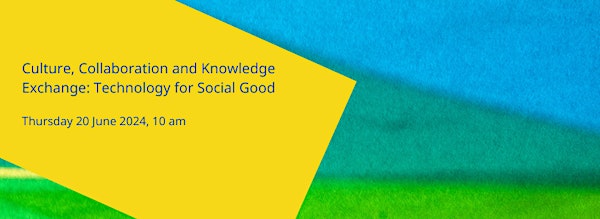
Culture, Collaboration and Knowledge Exchange: Technology for Social Good
Where research and the arts come together to generate social and cultural good using existing and emerging technologies.
Date and time
Location
Online
About this event
- 2 hours 30 minutes
The purpose of this NCACE policy workshop is to discuss and showcase the impacts and potentials of collaborations and transdisciplinary research projects between HEIs and the arts that generate social and cultural good, through the use of both existing and emerging technologies.
With the intense proliferation of interest in uses of, and concerns about technologies such as AI, this timely workshop seeks to highlight partnerships, projects and opportunities that bring research and the arts together to create positive social benefits through engaging and exploiting diverse technologies. It will also provide space to reflect on the potentialities, challenges and ethics associated with enacting and enabling better futures through collaborative endeavours.
We are also seeking to highlight the roles that policy, funding bodies initiatives and other actors are playing, or could play in supporting social good now and into the near future.
Through Culture and Collaborations on Technology for Social Good we aim to:
- showcase innovative initiatives being co-developed by partners across Higher Education, the arts and cultural sector, technology, local authorities, and wider communities that demonstrate the diversity of creative technology collaborations for wider social good.
- encourage dialogue and discussion on the notion of the social good and how we might better imagine, understand, design and deploy technology to support people, place and planet.
Contributors include: Dr Josh Edelman (Head of Manchester School of Theatre, MMU), Dr Marc Garrett (Furtherfield), Professor Sarah Hayes (Bath Spa University), Professor Bryce Lease (Centre for Performance, Technology and Equity, Royal Central School of Speech and Drama), Professor Helen Manchester (University of Bristol) Sinead Ouillon (Coventry University), Lara Ratnaraja (Independent) and we will be announcing others in the near future.
This event is aimed at researchers, funders, policy-makers, artists, cultural organisations and others with an active interest in how existing and emerging technologies can be developed and exploited to support social, cultural and environmental good.
We warmly invite attendees from across the higher education, arts and cultural, local and regional government, policymakers, funders and other public and private sector bodies working in this field to join us for a morning of key notes, case studies, panel discussions and workshops.
Call for contributors: We welcome proposals for contributions and/or case studies around these themes. If you are involved in the research, curation, delivery or policy development or in funding such work and would like to ocntribute, do please contact us.
If you have written reports, papers, blogs or other relevant materials on this theme that you would like to share via the NCACE Repository, we would also like to hear from you. We are keen to hear about initiatives that are both established and emerging.
Case Studies: Do also get in touch with us if you would like to talk about research you are undertaking in this field or about an initiative (large or small) that you are active in developing or supporting as we are also currently developing a range of case-studies for publication later in the year.
Email: laura@tcce.co.uk in the first instance.
Technology for Social and Cultural Good is one of four themes under-pinning NCACE’s work.
NCACE is an initiative led by TCCE and funded by Research England to facilitate and support capacity for Knowledge Exchange between Higher Education and the arts and cultural sector across the UK, with a particular focus on evidencing and showcasing the social, cultural, environmental, as well as economic, impacts of such activities.